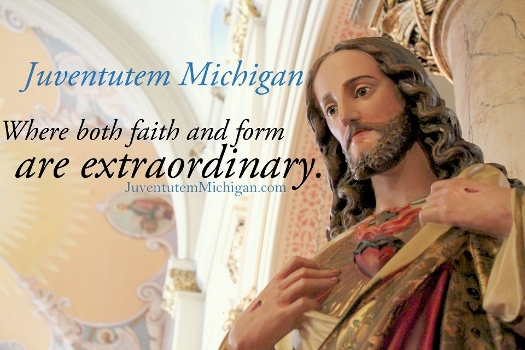
"I will go in unto the Altar of God
To God, Who giveth joy to my youth"
Tridentine Community News (October 13, 2013):

Bishop Fabbro to Attend and Preach at Mass at Assumption Church on November 3
Diocese of London Bishop Ronald Fabbro will make his first pastoral visit to Windsor’s St. Benedict Tridentine Community on Sunday, November 3 at the usual 2:00 PM Mass. His Excellency will sit in choir during the Mass and will preach the homily. A reception will follow the Mass in the Social Hall.
The timing of His Excellency’s visit coincides with the 22nd Anniversary of the Windsor Tridentine Mass – a most fitting happenstance.
Solemn High Mass in Lansing’s St. Mary Cathedral
Lansing’s Blessed John XXIII Tridentine Community will hold its first Solemn High Mass in the main, upper church at St. Mary Cathedral on Sunday, November 24 at 5:00 PM. This community normally uses the more humble lower church of the Cathedral. Music will be supplied by the choir of Assumption Grotto Church. The Mass is being promoted to the broader Lansing community as a musical event, a rare opportunity to hear sacred music in the setting for which it was composed. The Blessed John XXIII Community is to be commended for undertaking ventures such as this with very little guidance or local examples to follow. We can learn a lesson from their creative promotion of the event, a good way to introduce people to the Extraordinary Form who might otherwise not go.
For more information, visit www.getholy.com.
Why Latin?
A reader asked a basic, but good question: Why does the Church mandate the use of Latin as the language of the Extraordinary Form of Holy Mass? The reasons are several:
Universality: Using one language of worship ensures that all Catholics worldwide who worship according to this form employ the same texts, a vivid example of the catholicity (small “c”) of the Church.
Timelessness: Latin is free from the whims of language evolution. Expressions in Latin mean the same today that they did hundreds of years ago. This is one of the advantages of using a “dead” language: one doesn’t have to worry about adapting the wording every decade or two to suit the generally evolving phraseology of a vernacular tongue. Our Catholic faith does not change, and neither should the meaning of our worship.
Consistency: Latin texts are typically given quite literal translations into the vernacular in hand missals and worship aids. These translations are relatively free of politicization. The translations express the same meaning regardless of which vernacular tongue is employed. As a result, the vernacular translations have essentially the same meaning worldwide.
A gateway to culture: The use of a specifically-designated sacral language encourages the development of music and sacred art which employs that language for sacred ends. Composers, painters, and artists of all sorts are thereby moved to employ Latin within their respective arts in service to the Church, knowing it will have worldwide appeal.
The above reasons have stood the test of time for centuries. They make arguably even more sense nowadays, when technology makes it easy to publish worship aids, booklets, and missals to assist the faithful’s comprehension. Furthermore, Latin is not the only liturgical language. Other faiths worship in designated languages, perhaps most notably the Jewish faith’s employment of Hebrew. Many of the same considerations apply.
It’s also interesting to note that while the Church obviously “owns” the texts of the Extraordinary Form, those Latin texts, and the commonly-used Douay-Rheims-based English translations of them, are free from the copyrights that restrict use of the Ordinary Form vernacular translations. That freedom has allowed for a cottage industry of worship aids and tutorials to arise, helping to teach and promote the Tridentine Mass in our internet age.
An Act of Contrition
A beautiful prayer found on an old prayer card:Forgive me my sins, O Lord,Tridentine Masses This Coming Week
forgive me my sins;
the sins of my youth,
the sins of my age,
the sins of my soul,
the sins of my body;
my idle sins,
my serious voluntary sins;
the sins I know,
the sins I do not know;
the sins I have concealed for so long,
and which are now hidden from my memory.
I am truly sorry for every sin, mortal and venial,
for all the sins of my childhood up to the present hour.
I know my sins have wounded Thy Tender Heart,
O My Savior, let me be freed from the bonds of evil through
the most bitter Passion of My Redeemer. Amen.
O My Jesus, forget and forgive what I have been. Amen.
- Mon. 10/14 7:00 PM: Low Mass at St. Josaphat (St. Callistus I, Pope & Martyr)
- Tue. 10/15 7:00 PM: Low Mass at Assumption-Windsor (St. Teresa of Avila, Virgin)
- Sun. 10/20 12:00 Noon: High Mass at St. Albertus (Twenty-second Sunday After Pentecost)


That *is* a beautiful prayer (and thank goodness the USCCB didn't copyright the D-R Bible as they did with the NAB...oops!)
ReplyDelete